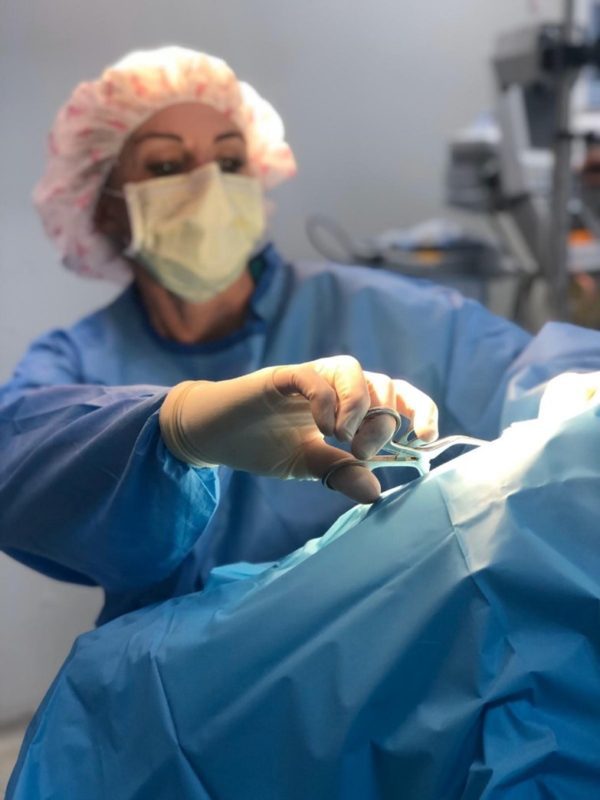The USC Caruso Department of Otolaryngology – Head and Neck Surgery recently added two new training programs to its already renowned residency and fellowship programs: an ACGME-accredited fellowship in Neurotology, and a Clinician-Scientist Training Program for residents and medical students.
By Geoffrey Waring

The USC Caruso Department of Otolaryngology – Head and Neck Surgery already houses a renowned residency program, as well as established fellowships in Sleep Surgery, Speech-Language Pathology, and Laryngology. But the department is now expanding its fellowship and residency options with two brand new programs that will create impact in the medical education community in much-needed areas: a new ACGME-accredited fellowship program in Neurotology, and a Clinician-Scientist Training program for residents and medical students that seeks to increase the number of trained doctors who participate actively in research.
The Neurotology fellowship is currently preparing for interviews and will welcome its first fellow in July of 2023. According to Joni K. Doherty, MD, PhD, FACS, the director for the new Neurotology Fellowship program, the program will provide top-rate fellowship training in a specialty where it’s direly needed.
“The fellow learns the techniques we’re doing with the goal of becoming board-certified as a neurotologist, and they can be another neurotologist out there who does skull-based surgery,” said Dr. Doherty. “There are few of us and we’re usually based in large academic centers or in big cities. People like us are hard to come by in smaller towns and the program and the community can benefit from that by having more doctors that specialize in the ear.”
The nerves that connect the ear to the brain are one of the most complex systems in the human body, and neurotology — which focuses on issues related to the inner ear and skull base, including nerves that control things like balance, hearing, swallowing, and voice — requires additional training for specialists to be able to perform procedures like cochlear implantation and treating skull-based tumors. The USC Caruso Department of Otolaryngology – Head and Neck Surgery’s resources, expertise, and access to interdisciplinary training makes the department an ideal home for a Neurotology fellowship program.
“We have such an amazing array of interesting and rare cases that we do here, both skull-based surgery and middle ear and inner ear surgery,” said Dr. Doherty. “Also, we have many scientific researchers that have labs and NIH funding. In fact, we’re in the top ten in the nation for NIH funding for an otolaryngology department.”
“All of that combined has a lot to offer for a fellow in neurotology.”
The neurotology fellow will also benefit from the department’s connection to the Los Angeles Children’s Hospital, where a number of pediatric cochlear implant procedures are performed. New research by department chair John S. Oghalai, MD, and others has shown that cochlear implantation at very young ages can provide tremendous benefits for children with hearing loss and developmental impairments. The neurotology fellow will have ample experience at the Los Angeles Children’s Hospital, the top ranked children’s hospital on the West Coast and a major center for pediatric cochlear implantation.
The Neurotology Fellowship program is only one of the new educational and training opportunities recently developed within the department. It joins the new Clinician-Scientist Training Program, which hosts one resident and several medical students each year, providing training for becoming that rare thing: a clinician who also actively conducts research.
“Our goal is to train excellent clinicians who want NIH-funded research to be an important component of their long-term academic career,” said Dr. Oghalai. “We want our trainees to perform impactful research that improves patient health.”
The Clinician-Scientist Training Program recruited its first resident this year — Stephanie Wong, MD — and admitted two medical students.
Not only is the program aimed at producing more clinician-scientists — vital in leveraging the crossover experience of doctors to help bridge research and application — but the program also puts a heavy emphasis on recruiting diverse students and residents for training. The importance of diversity at USC Keck — both in the diversity of patients seen, and the diversity of the trainees recruited by the institution — is coming at a time when diversity in medicine has become a major emphasis within the medical community. And at a time when only 35% of otolaryngology residents are women, the department’s residency program is currently over 50% female doctors.
“We have always ranked intelligence and character above everything else during the resident interview process at USC. I am proud that our cohort of residents meet these high standards,” said Dr. Oghalai. “We are lucky to have an above-average proportion of women trainees in our program as a wonderful consequence of this process.”
The new Neurotology Fellowship and Clinician-Scientist Training program for residents and medical students are only two of the new training programs being developed at the USC Caruso Department of Otolaryngology – Head and Neck Surgery. Looking forward, the department plans to continue expanding its training and educational offerings to leverage Keck Medicine of USC’s expertise and resources in order to provide the best training for future Otolaryngologists and Head and Neck Surgeons in the areas where they are needed most.
“Our graduates end up working not only in leading academic medical centers but also in private practice positions throughout the US where they hold esteemed positions within their communities,” said Dr. Oghalai. “We are proud of our trainees and their accomplishments.”
To learn more about the USC Caruso Department of Otolaryngology – Head and Neck Surgery’s new Neurotology Fellowship program, click here.
To learn more about the department’s Clinician-Scientist Training Program residency, click here.
To learn more about the Clinician-Scientist Training Program for medical students, click here.